|
|
|
Sort Order |
|
|
|
Items / Page
|
|
|
|
|
|
|
| Srl | Item |
| 1 |
ID:
118599
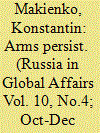

|
|
|
|
|
| Publication |
2012.
|
| Summary/Abstract |
Foreign Affairs recently published an article by Jonathan Caverley and Ethan B. Kapstein entitled "Arms Away. How Washington Squandered Its Monopoly on Weapons Sales." The article provides an extremely interesting view of the U.S. academics on developments in the arms market. Analyzing mainly changes in the U.S. position in this market, namely the loss by the United States in the 2000s of its monopoly on arms sales achieved in the 1990s, the authors also touch upon more fundamental issues. One of them is the general evolution of the configuration of players in this market. Another, largely theoretical issue is the basic factors, both political and economic, that influence this evolution. The main reason why the U.S. defense industry lost its position in the market, according to the authors, was that the U.S. defense industry focused on the production of cutting-edge and excessively expensive weapons, which have begun to lose to simpler and more affordable weapons systems made in Europe, Russia, Israel or even South Korea.
|
|
|
|
|
|
|
|
|
|
|
|
|
|
|
|
| 2 |
ID:
176667
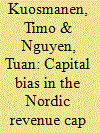

|
|
|
|
|
| Summary/Abstract |
Nordic energy market reform and the regulation of local monopolies in electricity transmission and distribution sectors have served as role models for many other countries worldwide. The first contribution of this paper is to clarify the conceptual distinction between the Nordic revenue cap approach and the British revenue cap regulation. Our second contribution is to show that the Nordic revenue cap is similar to the U.S.-style rate of return regulation in that both are subject to capital bias, known as the Averch-Johnson effect. The third contribution of this paper is to examine the magnitude of the capital bias and its welfare effects by means of numerical simulations. We show that the Nordic revenue cap generally decreases the monopoly profit, increases the output, decreases the price, and hence increases consumer surplus compared to the unregulated monopoly. The simulation results prove robust to changes in the parameter values and the functional form of the production function. Our numerical simulations reveal that relatively light handed regulation suffices to yield the main benefits.
|
|
|
|
|
|
|
|
|
|
|
|
|
|
|
|
| 3 |
ID:
189938
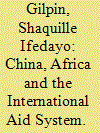

|
|
|
|
|
| Summary/Abstract |
The China–Africa relationship has received increased interest over the past few decades as scholars critically examine the challenge that China, in its quest for a closer strategic partnership with Africa, poses to the norms governing the neoliberal world order (NLWO). One crucial aspect of this is international aid, and how Chinese aid to Africa differs from Western aid. This paper argues that Chinese aid reduces the power of traditional aid donors to shape the development route of African countries. This new development finance ultimately breaks the monopoly of Western aid to decide how poor countries in the global ‘South’ develop. In doing so, the Sino–African aid relationship is challenging the current world order as it offers African states the possibility to decouple (or delink) themselves from the global economy. By challenging assumed neoliberal economic development fundamentals, this relationship, if harnessed correctly by African leaders, can pose longer-term ideological questions around the very set of ideas that underpin development itself, while enabling African states the policy space needed to pursue more sustainable development from an Afro-centric perspective. It is this possibility to delink, due to changing ideological fundamentals concerning economic development, that is the challenge China and Africa pose to the NLWO.
|
|
|
|
|
|
|
|
|
|
|
|
|
|
|
|
| 4 |
ID:
130445
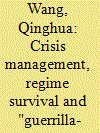

|
|
|
|
|
| Publication |
2014.
|
| Summary/Abstract |
Based on newly available memoirs and previously unexplored policy speeches by insiders, this article conducts a political analysis of the Chinese Communist Party's decision to radically expand college enrollment in June 1999. I argue that the decision exemplifies a "guerrilla-style approach" to policy-making. From late March to early June of 1999 when the radical expansion policy was formulated and legitimated, the top leadership ignored opposition from the Ministry of Education (MOE), overturned established policies and assumed de facto control over MOE bureaucratic power. This abrupt, forceful, disruptive and non-professional policy intervention, which aimed to ensure regime survival in the wake of the Asian financial crisis, was antithetical to regularized educational policy-making in post-Mao China.
|
|
|
|
|
|
|
|
|
|
|
|
|
|
|
|
| 5 |
ID:
183860


|
|
|
|
|
| Summary/Abstract |
India and South Africa approached the World Trade Organisation to negotiate the temporary waiver of Intellectual Property (IP) rights on Covid-19 vaccines to remove the artificial barrier of patents and boost vaccine production. This commentary advocates for the waiver of IP rights on Covid-19 vaccines. First, the article makes a case for the debate on the validity of the Covid-19 vaccine to qualify for a patent. Market failure and underinvestment in research and development arguments do not hold for granting a patent to Covid vaccines. Next, the article briefly reviews the evidence on the association between vaccination and virus mutations. Evidence suggests that waiving patents is vital to increase vaccination worldwide and curb mutation and reduce the risk of more infectious new variants. Finally, the article argues that the rationale for a patent is economical, based on incentivising innovation and therefore, the losses suffered by various sectors of the economy due to new variant induced fatalities and lockdowns need to be considered for a case for its waiver.
|
|
|
|
|
|
|
|
|
|
|
|
|
|
|
|
| 6 |
ID:
174966
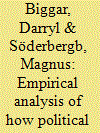

|
|
|
|
|
| Summary/Abstract |
It is known that regulators and customers value stable prices in monopolised energy markets. The purpose of this paper is to investigate what factors influence local energy distributors to care about, and seek to implement, stable prices. Because the literature has suggested that ownership and political ideology affect monopoly pricing behaviour, we pay particular attention to ideological and ownership heterogeneity across a large number of local jurisdictions in Sweden. Specifically, this paper investigates two different pricing aspects; first, actual pricing behaviour in the unregulated Swedish district heating market and, second, survey data where the district heating firms report how important they think price stability is for their level of competitiveness. The results show that district heating firms that operate in municipalities with a left-wing government (i) implement actual prices that follow the long-term price path to a larger extent and (ii) state that smoothed prices are more important for their level of competitiveness. Results are both statistically and economically significant at conventional levels.
|
|
|
|
|
|
|
|
|
|
|
|
|
|
|
|
| 7 |
ID:
190731
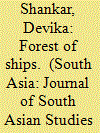

|
|
|
|
|
| Summary/Abstract |
This paper examines how the annexation of Malabar by the English East India Company in the last decade of the eighteenth century allowed the colonial administration to experiment with novel forms of state control in the region’s forests. At the same time, through a focus on the connections forged between Malabar’s forests and Bombay’s dockyards, this paper will use archival sources to examine the crucial role played by the timber monopoly introduced in 1806 in dislodging Malabar and its ports from their central position in the Indian Ocean economy and facilitating their incorporation into the margins of the emerging colonial economy.
|
|
|
|
|
|
|
|
|
|
|
|
|
|
|
|
| 8 |
ID:
130963
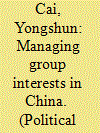

|
|
|
|
|
| Publication |
2014.
|
| Summary/Abstract |
Monopolistic Industries IN CHINA have been criticized heavily in recent years for their unrestrained pursuit of interests at the expense of the public or other parties.1 Such criticisms are not unfounded, as exemplified by the Chinese oil industry. In China, the China National Petroleum Corporation and the China Petroleum and Chemical Corporation, together with the China National Offshore Oil Corporation, have monopolized the oil supply in the country.2 In 2006, China had approximately 660 privately owned oil wholesale enterprises and 45,060 privately owned gas stations. However, by early 2008, two thirds of the wholesale enterprises and one third of the gas stations were closed, and another 10,000 gas stations lost money. This situation was a result of a monopoly of the oil industry by state-owned companies. When oil prices were high, the China National Petroleum Corporation and China Petroleum and Chemical Corporation refused to provide oil to privately owned companies. The national government agencies repeatedly urged the two companies to provide oil to private businesses. The premier and vice premiers also gave 14 instructions to require them to provide oil. But all of these were largely ignored by the two companies
|
|
|
|
|
|
|
|
|
|
|
|
|
|
|
|
| 9 |
ID:
171487
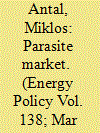

|
|
|
|
|
| Summary/Abstract |
This article is about energy price comparison websites (PCWs). Using the example of Great Britain, it studies whether a competitive market of energy PCWs or a single non-commercial PCW can serve consumers better. Results are unambiguous. Households currently pay more than £100 million per year through their energy bills to commercial energy PCWs. The business model of these PCWs is largely based on creating deviations from consumer choice considered ideal by the regulator. As a result, people overpay for energy and retail market competition is adversely affected. Furthermore, commercial PCWs do not efficiently increase consumer engagement, so more households are on expensive tariffs than in the alternative system. Commercial PCWs also introduce a number of risks. As trade-offs in the competitive case are unavoidable, regulatory changes cannot make the market better than the one-non-profit-site solution. A single non-commercial PCW, such as the one operated by Citizens Advice, can provide a higher quality service at a substantially lower cost. Therefore, the interests of consumers can best be protected by shutting down commercial PCWs. A theoretical insight is that a competitive market of PCWs emerges if not explicitly prohibited by regulation, but reduces consumer welfare: this should be considered a “parasite market”.
|
|
|
|
|
|
|
|
|
|
|
|
|
|
|
|
| 10 |
ID:
110487
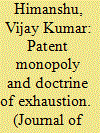

|
|
|
|
|
| Publication |
2011.
|
| Summary/Abstract |
A patent is granted for an invention that is novel, non-obvious, and has an industrial application. The proprietor of the patent grant is able to exploit and control the use of patented matter. Patent as a form of personal property may be assigned, licensed, mortgaged and may devolve by operation of law. The patent exhaustion doctrine, also known as the first sale doctrine, operates to 'exhaust,' or extinguish, the exclusive rights of sale and use as to patented articles sold with the patent owner's authorization. In this background, this article develops the concept of exhaustion and surveys the nature, scope and ambit of the doctrine of patent exhaustion. The relevance of doctrine and right of exclusivity is thoroughly discussed with regard to commercial transactions involving licensing, assignment, sale, disposal or offer of disposal of the patented articles. The article concludes that those conditions which are within the scope of patent monopoly act as limits on the doctrine of exhaustion of right in the sold goods. The exhaustion of right is limited to patented goods, therefore the purchaser has all rights except right to reconstruct. This article while discussing the doctrine from international and national perspective suggests rethinking of the nomenclature of doctrine of exhaustion as contained in Article 6 of the TRIPS Agreement.
|
|
|
|
|
|
|
|
|
|
|
|
|
|
|
|
| 11 |
ID:
095519
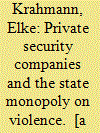

|
|
|
|
|
| Publication |
Frankfurt, PEace Research Institute, 2009.
|
| Description |
34p.
|
| Series |
PRIF report no. 88
|
| Standard Number |
9783937829890, pbk
|
|
|
|
|
|
|
|
|
|
|
|
Copies: C:1/I:0,R:0,Q:0
Circulation
| Accession# | Call# | Current Location | Status | Policy | Location |
| 054946 | 363.289/KRA 054946 | Main | On Shelf | General | |
|
|
|
|
|
|
|
|
|